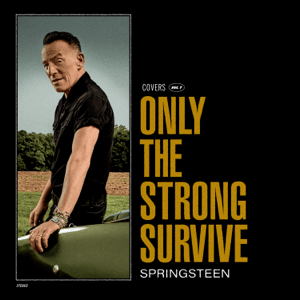 From the start of his career, Bruce Springsteen would pepper his live sets with covers ready-made for the E Street Band to rip, usually crowd-pleasing numbers by Mitch Ryder and Gary U.S. Bonds. Even in this century he’s led the modern E Streeters through covers for specific occasions, such as “Purple Rain” and “London Calling” in tribute to their deceased auteurs, and even in Australia where he’s honored AC/DC with “Highway To Hell” and INXS with “Don’t Change”. He has always been a student of rock history, and particularly the sounds of classic soul.
From the start of his career, Bruce Springsteen would pepper his live sets with covers ready-made for the E Street Band to rip, usually crowd-pleasing numbers by Mitch Ryder and Gary U.S. Bonds. Even in this century he’s led the modern E Streeters through covers for specific occasions, such as “Purple Rain” and “London Calling” in tribute to their deceased auteurs, and even in Australia where he’s honored AC/DC with “Highway To Hell” and INXS with “Don’t Change”. He has always been a student of rock history, and particularly the sounds of classic soul.Still, the idea that half a century into his career he’d record an album of nothing but covers—the Pete Seeger album notwithstanding—surprised and concerned many (except of course the diehards who were prepared to love anything he belched onto plastic). Moreover, rather than use the E Street Band, he left the performing and arranging on Only The Strong Survive to yes man Ron Aniello, while the Boss was content to just sing. (Granted, this was the impetus behind John Lennon’s oldies album, which didn’t have the easiest gestation itself.) Add the cover art, which used only his last name, threatened that this was the first of who knows how many volumes, and showed him posing next to yet another car but looking like an extra from The Sopranos, and he was in danger of turning into Rod Stewart, and nobody wants that.
Nonetheless, Bruce throws himself into the music, because he loves it. For the most part, these aren’t songs that were overplayed on the oldies stations back when the ‘60s were mined for those playlists.
The first voice we hear on the album isn’t his, but the backing vocalists setting up the title track. “Soul Days” was a hit from this century by Dobie “Drift Away” Gray, here set up as duet of sorts with the legendary Sam Moore, who already joined Bruce on the Human Touch album. This track should have been faded before the in-studio shout out, but it’s forgotten once the next track starts. It’s astounding to realize that “Nightshift”, a 1985 tribute to the recently departed Marvin Gaye and Jackie Wilson, was a hit song for the suddenly Lionel Richie-less Commodores while Bruce himself was in the middle of the Born In The U.S.A. tour. (One wonders whether Volume 2 will include his interpretation of highlights from the Billy Ocean catalog.) “Do I Love You (Indeed I Do)” gets points for beginning with a guitar and glockenspiel like classic E Street Band, but the horns and strings bring it back to the sound at hand. On “The Sun Ain’t Gonna Shine Anymore” he can’t decide if he wants to be Frankie Valli or Scott Walker, so he tries both; god forbid he use his own voice. “Turn Back The Hands Of Time” is one of the more musically interesting tracks, considering the chord changes and key shift, whereas “When She Was My Girl” was a surprise early-‘80s hit for the Four Tops, who are also represented by the more vintage “7 Rooms Of Gloom”.
“Hey, Western Union Man” comes from the same Jerry Butler album as the title track; modern listeners may well wonder what this “telegram” thing is that keeps getting mentioned. The Temptations get their nod with “I Wish It Would Rain”, a song that’s nearly impossible to screw up, and he doesn’t. Tangentially, “What Becomes Of The Brokenhearted” is a very faithful cop of Jimmy Ruffin’s version. Unfortunately, “Don’t Play That Song” is set in a “party” atmosphere, but fans will likely thrill to the reference to “summer nights down by the shore”. William Bell is represented by the obscure (to us) “Any Other Way” and “I Forgot To Be Your Lover” (another duet with Sam Moore) which we only knew in Billy Idol’s drastic overhaul. “Someday We’ll Be Together” delivers the same sense of farewell as it was when it was a Supremes single in name only.
Only The Strong Survive is not awful. Nor is it absolutely necessary. True believers will love it; everyone else should dig up the original versions, and anything else those artists did.
Bruce Springsteen Only The Strong Survive (2022)—3
No comments:
Post a Comment